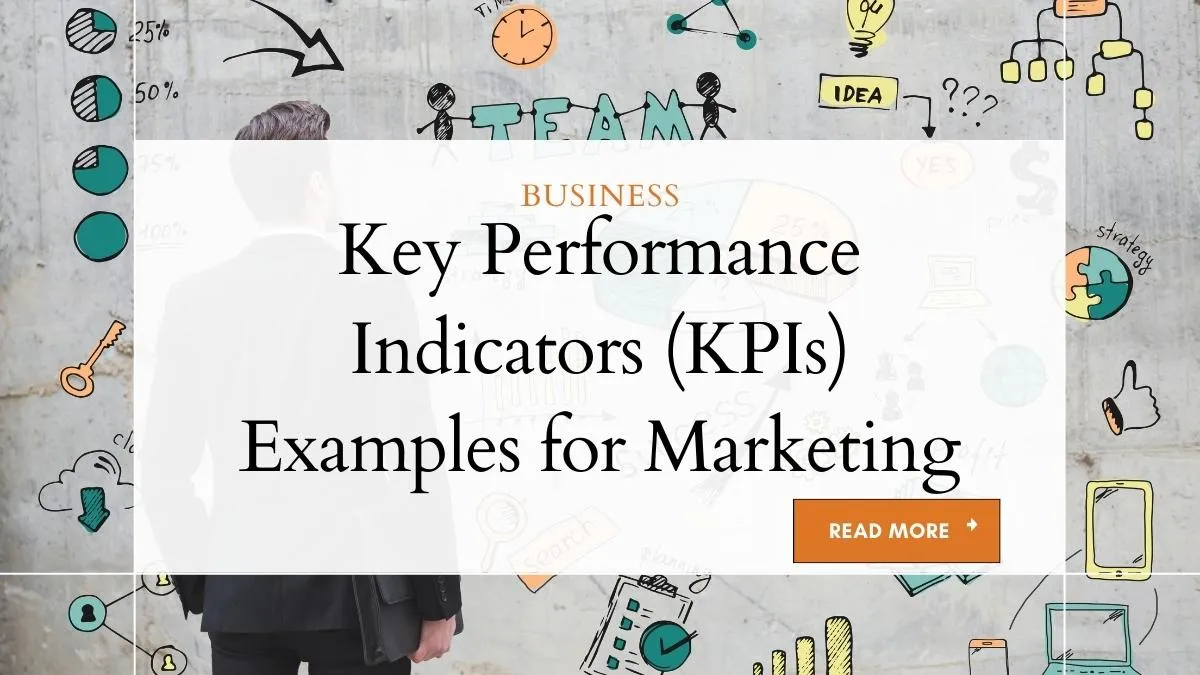
Are you struggling to measure the success of your marketing campaigns? Do you find it challenging to track progress towards specific marketing goals and objectives?
If so, then it’s time to focus on Key Performance Indicators (KPIs), the metrics that matter in marketing.
KPIs are critical for measuring the effectiveness of marketing campaigns, and they help businesses make informed decisions about their marketing strategies.
By tracking KPIs, marketers can identify which campaigns are delivering the best results and optimize their efforts accordingly. In this article, we’ll discuss some of the most essential KPIs for marketing and provide real-world examples to help you track your progress towards your marketing goals.
Whether you’re looking to improve your SEO, boost your social media presence, or drive more conversions, this article has got you covered with some key performance indicators examples for marketing.
In particular, we’ll explore KPIs related to organic search traffic, backlinks, on-page SEO, and social media.
We’ll cover the basics of each KPI, explain why it matters, and provide examples of how businesses can track their progress towards achieving their marketing goals.
By the end of this article, you’ll have a better understanding of the KPIs that matter most for measuring the success of your marketing campaigns and a roadmap for how to track and optimize your marketing efforts for maximum impact.
Also, you can able to know,
What are key performance indicators?
Key Performance Indicators (KPIs) are metrics used to measure the success of marketing campaigns. In marketing, KPIs are used to track progress towards specific goals and objectives.
By monitoring KPIs, marketers can assess the effectiveness of their campaigns and make data-driven decisions to improve their results.
KPI tracking is particularly important in Search Engine Optimization (SEO) because it allows marketers to understand how their efforts are impacting their website’s search engine rankings and traffic.
Without tracking KPIs, it can be difficult to determine which SEO tactics are working and which ones need to be improved.
Don’t miss: How to Get into Digital Marketing
Key Performance Indicators for Marketing
There are numerous KPIs that businesses can track to measure the success of their marketing campaigns, and it’s crucial to choose the ones that align with your specific marketing goals.
One set of KPIs that are particularly important for measuring the effectiveness of SEO efforts are organic search traffic KPIs.
These metrics include the total number of organic traffic to your website, the specific keywords that are driving traffic, and your website’s average position in search engine results pages (SERPs).
Businesses can also track click-through rate (CTR) and bounce rate to understand how engaged their website visitors are and identify areas where they can optimize their website for better user experience.
Another essential set of KPIs for marketing are those related to backlinks. Backlinks are an important factor in determining the credibility and authority of a website, and tracking metrics such as domain authority, page authority, the number of referring domains, and link quality can help businesses understand how their website is performing in terms of backlinks.
By tracking these KPIs, businesses can identify areas for improvement, such as increasing the number of referring domains or improving the quality of their backlinks to boost their website’s overall SEO performance.
Don’t miss: How to Become a Marketing Manager
Organic Search Traffic KPIs
Organic search traffic is a critical KPI for measuring the effectiveness of SEO efforts. It refers to the traffic that comes to your website through organic search engine results rather than through paid advertising or other channels.
By tracking this metric, businesses can understand how well their website is performing in search engines and identify areas for improvement.
To track organic search traffic, businesses can use tools such as Google Analytics to monitor the total number of organic visitors to their website over a given period, such as a month or quarter.
In addition to tracking the total number of organic visitors, businesses can also track organic search keywords.
These are the specific search terms that people are using to find your website in search engine results pages.
By monitoring the most popular organic search keywords, businesses can optimize their website’s content to better align with their target audience’s search intent and drive more targeted traffic to their website.
Tools like Ahrefs and SEMrush provide insights into which keywords are driving traffic to your website and how you can optimize your content to rank better in search results for those keywords.
01. Organic Traffic – This KPI measures the number of visitors who arrive at a website through organic search results.
02. Organic Search Keywords – This KPI tracks the number of keywords a website is ranking for in organic search results.
03. Average Position – This KPI measures the average position of a website’s organic search results.
04. Click-Through Rate (CTR) – This KPI tracks the percentage of people who click on a website’s organic search result.
05. Bounce Rate – This KPI measures the percentage of visitors who leave a website after viewing only one page.
Backlink KPIs
Backlinks are an essential KPI for measuring the credibility and authority of a website. A backlink is a link from another website to your website, and search engines use this as an indicator of the relevance and quality of your website’s content.
Domain Authority (DA) and Page Authority (PA) are two critical backlink KPIs that businesses should track to measure the strength of their website’s backlink profile.
DA is a metric developed by Moz that predicts how well a website will rank in search engine results pages based on the quality and quantity of backlinks pointing to it.
PA, on the other hand, measures the authority of individual pages on your website based on the same criteria.
By tracking these KPIs, businesses can understand how well their website is performing in terms of backlinks and identify areas for improvement.
Another essential backlink KPI to track is the number of referring domains. Referring domains are the number of unique websites that link to your website.
The more referring domains you have, the more search engines see your website as credible and authoritative.
Businesses should aim to increase the number of referring domains to their website to improve their website’s overall SEO performance.
However, it’s essential to ensure that the referring domains are of high quality, as search engines prioritize the quality of backlinks over the quantity.
Tools such as Ahrefs and SEMrush provide insights into the number and quality of referring domains to your website, helping you to understand how to improve your website’s backlink profile.
06. Domain Authority – This KPI measures the overall authority and trustworthiness of a website’s domain.
07. Page Authority – This KPI measures the authority and trustworthiness of a specific page on a website.
08. Number of Referring Domains – This KPI tracks the number of unique domains that are linking back to a website.
09. Link Quality – This KPI measures the quality of links pointing to a website, including factors such as relevance, authority, and anchor text.
On-page SEO KPIs
On-page SEO KPIs refer to the metrics that track how well a website’s content and structure are optimized for search engines.
Keyword usage is an essential KPI to track in on-page SEO. It refers to how often a specific keyword appears on a web page or across a website.
By optimizing the usage of relevant keywords, businesses can improve their website’s visibility and ranking in search engine results pages.
Additionally, content quality is another crucial KPI to track. Search engines prioritize high-quality, relevant, and engaging content that provides value to users.
By monitoring content quality KPIs, such as time on page, page views, and bounce rate, businesses can identify which pieces of content are resonating with their audience and improve those that are not performing as well.
User experience (UX) is another essential on-page SEO KPI. Google has made it clear that it prioritizes websites that provide a good user experience, and businesses should optimize their websites accordingly.
UX KPIs, such as page load time, mobile responsiveness, and usability, provide insights into how well a website is optimized for user experience.
By optimizing these KPIs, businesses can improve their website’s ranking and increase user engagement and conversions.
Tools like Google’s PageSpeed Insights and SEMrush’s Site Audit can help businesses identify areas where they can optimize their website’s UX.
10. Keyword Usage – This KPI measures the frequency and placement of target keywords on a website.
11. Content Quality – This KPI assesses the quality of a website’s content, including factors such as relevance, originality, and readability.
12. User Experience – This KPI tracks how easily users can navigate and interact with a website.
13. Page Load Time – This KPI measures how quickly a website’s pages load, which can impact both user experience and search engine rankings.
Social Media KPIs
Social media KPIs refer to the metrics used to track the performance of a business’s social media presence.
One of the most critical social media KPIs is social media followers, which refers to the number of people who follow a business’s social media accounts.
This KPI provides insight into the size of a business’s audience on social media and their potential reach. It’s essential to track social media followers and identify which platforms are performing well and which ones require more effort.
Another crucial social media KPI is engagement rate, which refers to the percentage of people who engage with a business’s social media content.
This KPI measures how well a business’s content resonates with its audience and how engaged they are with the brand.
The engagement rate is calculated by dividing the total number of engagements (likes, comments, shares, etc.) by the total number of impressions (views) and multiplying the result by 100.
A high engagement rate indicates that a business’s content is resonating well with its audience and can lead to increased brand awareness and customer loyalty.
Tools like Hootsuite and Sprout Social can help businesses track and analyze their social media KPIs and optimize their social media strategy accordingly.
14. Social Media Followers – This KPI measures the number of followers a brand has on social media.
15. Engagement Rate – This KPI tracks the percentage of followers who engage with a brand’s social media content, such as liking, sharing, or commenting.
16. Social Shares – This KPI measures the number of times a brand’s social media content is shared by users.
17. Brand Mentions – This KPI tracks the number of times a brand is mentioned on social media, which can indicate overall brand awareness and sentiment.
How to Track KPIs
Tracking KPIs is essential to understanding how well a business’s marketing efforts are performing and identifying areas for improvement.
Google Analytics is a powerful tool for tracking website KPIs. It provides insights into website traffic, user behavior, and conversion rates, and can help businesses identify which marketing channels are driving the most traffic and conversions.
By tracking KPIs in Google Analytics, businesses can optimize their website’s performance and improve user engagement and conversion rates.
In addition to Google Analytics, there are several SEO tools available that can help businesses track KPIs. Ahrefs, SEMrush, Moz, and Google Search Console are all popular tools that provide insights into organic search traffic, backlinks, on-page SEO, and more.
These tools can help businesses identify areas for improvement in their SEO strategy, such as optimizing keywords, improving content quality, and acquiring high-quality backlinks.
By tracking KPIs using these SEO tools, businesses can make data-driven decisions to improve their website’s performance and increase their online visibility.
Google Analytics – This free tool from Google allows marketers to track website traffic and user behavior, including many of the KPIs listed above.
SEO Tools – There are several paid tools that can help marketers track and analyze KPIs related to SEO, including:
18. Ahrefs – A comprehensive SEO tool that includes features for tracking backlinks, organic search traffic, and more.
19. SEMrush – A popular SEO tool that provides detailed insights into organic search rankings, backlinks, and more.
20. Moz – Another popular SEO tool that offers features for tracking search engine rankings, backlinks, and on-page SEO.
21. Google Search Console – This free tool from Google provides insights into a website’s search engine performance, including organic search traffic and keyword rankings.
Key Performance Indicators FAQs
“Key Performance Indicators (KPIs) FAQs” is a comprehensive guide that answers common questions related to KPIs and their use in measuring performance. This resource covers topics such as the definition of KPIs, their importance in various industries, how to select the right KPIs for your business, and how to track and measure KPIs effectively.
The guide also provides practical advice for setting and achieving KPIs, including tips for optimizing your marketing efforts, improving customer satisfaction, and increasing revenue growth. Whether you are new to KPIs or looking to enhance your existing performance measurement strategy, this guide can help you gain a better understanding of how KPIs can help you drive business success.
Overall, “Key Performance Indicators (KPIs) FAQs” is a valuable resource for anyone looking to improve their performance measurement and optimize their business performance. The guide offers clear and concise answers to common questions, making it an easy-to-use reference tool for businesses and marketers alike.
What is the most important KPI for marketing?
There is no one “most important” KPI for marketing as different businesses have different goals and objectives. The most important KPI for marketing depends on the business’s specific goals and objectives, and the marketing channels they are using.
For example, organic search traffic and conversion rate may be crucial KPIs for an e-commerce business, while social media followers and engagement rate may be more important for a business focused on building brand awareness.
What is KPI for marketing process?
KPIs for marketing process are metrics used to track the performance of a business’s marketing efforts. These metrics may include organic search traffic, conversion rate, backlinks, social media followers and engagement rate, among others.
The KPIs for marketing process will vary depending on the business’s goals and objectives, and the specific marketing channels being used. By tracking KPIs, businesses can optimize their marketing efforts and make data-driven decisions to improve their overall performance.
How to measure marketing performance?
To measure marketing performance, businesses can use Key Performance Indicators (KPIs) which are metrics used to track the performance of their marketing efforts. Different KPIs can be used to measure different aspects of marketing, such as website traffic, conversion rates, social media engagement, and more.
To measure marketing performance, businesses can use tools such as Google Analytics, Ahrefs, SEMrush, Moz, and others, which provide valuable insights into website traffic, user behavior, and conversion rates. By analyzing these metrics, businesses can identify areas for improvement and make data-driven decisions to optimize their marketing efforts.
It’s also important to set specific goals and objectives for marketing efforts and regularly review and update them. By setting goals, businesses can measure their progress and ensure that their marketing efforts are aligned with their overall business objectives.
What is marketing performance analysis?
Marketing performance analysis is the process of evaluating the effectiveness of a business’s marketing efforts. This involves analyzing data and metrics related to various marketing channels, such as website traffic, conversion rates, social media engagement, and more.
The purpose of marketing performance analysis is to identify areas where a business’s marketing strategy may be falling short, as well as areas of strength that can be leveraged for continued growth. By regularly analyzing marketing performance, businesses can make data-driven decisions to optimize their marketing efforts and improve overall business performance.
Marketing performance analysis can be done through various tools and platforms, such as Google Analytics, Ahrefs, SEMrush, Moz, and others. By using these tools to track Key Performance Indicators (KPIs), businesses can measure the success of their marketing campaigns and make adjustments as needed.
Why is performance marketing important?
Performance marketing is important because it allows businesses to track the performance of their marketing efforts and measure the return on their investment. With performance marketing, businesses can set specific goals and Key Performance Indicators (KPIs), and then measure their progress towards achieving those goals.
By tracking the performance of their marketing campaigns, businesses can identify areas for improvement and make data-driven decisions to optimize their marketing efforts. Performance marketing also allows businesses to measure the effectiveness of their marketing spend, and allocate their resources towards the channels that are delivering the best results.
Overall, performance marketing helps businesses to increase their marketing efficiency and drive revenue growth by focusing on the channels and tactics that are most effective for their business.
Don’t miss: Best Email Marketing Tips with Email Collecting Secrets
The bottom line
Tracking KPIs is crucial for measuring the success of marketing campaigns and optimizing SEO efforts.
By monitoring KPIs related to organic search traffic, backlinks, on-page SEO, and social media, marketers can gain valuable insights into how their campaigns are performing and make data-driven decisions to improve their results.
With the help of tools like Google Analytics and SEO software like Ahrefs, SEMrush, Moz, and Google Search Console, tracking KPIs has never been easier.
By regularly monitoring KPIs and using the insights gained to refine and improve marketing strategies, marketers can achieve their goals and drive more traffic, engagement, and conversions to their websites.










